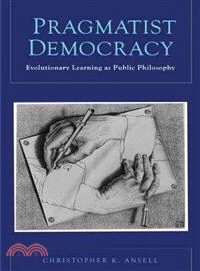Pragmatist Democracy ─ Evolutionary Learning as Public Philosophy
商品資訊
ISBN13:9780199772445
替代書名:Pragmatist Democracy
出版社:Oxford Univ Press USA
作者:Christopher K. Ansell
出版日:2011/09/07
裝訂/頁數:平裝/280頁
規格:23.5cm*15.2cm*1.9cm (高/寬/厚)
定價
:NT$ 2052 元優惠價
:90 折 1847 元
無庫存,下單後進貨(到貨天數約30-45天)
下單可得紅利積點:55 點
商品簡介
作者簡介
相關商品
商品簡介
Barack Obama is often lauded as a 'pragmatist,' yet when most people employ the term, they mean it in the vaguest sense: that he's practical and willing to compromise to get things done. However, the public philosophy of pragmatism, which has been the subject of a rich revival in the past couple of decades, is far more than this. First developed in the late nineteenth century, pragmatism is primarily a way of thinking--an anti-dualist philosophy that attempts to overcome the dichotomies between self and object, nature and culture, mind and body, theory and practice, and fact and value. When applied to governance, pragmatists advocate the use of tactics like third party mediation and problem-solving to achieve anti-dualist principles: cosmopolitan localism, analytical holism, progressive conservatism, and processual structuralism.
In Pragmatist Governance, Chris Ansell begins with a theory of the concept and then explains why the approach is ideal for addressing today's governance problems. For instance, while many think that bureaucracy's unchecked growth is the fundamental problem facing democracy today, pragmatism suggests the opposite: that public agencies can effectively manage the relationship between governance and democracy if they focus on building consent for public problem-solving. Ansell argues that wishing away bureaucracy will not do given what we know about the indispensible role of institutions in contemporary governance. Utilizing pragmatist concepts, Ansell rethinks the design of institutions, arguing that they are neither the simple products of rational design that can be endlessly tinkered with nor 'congealed taste'--where institutions represent the timeless customs and values of a people. Along with overcoming this dualism, Ansell also challenges us to rethink our approach to governance. Instead of moving from one extreme to the other--from bureaucracy to 'post-bureaucracy' or 'public entrepreneurialism'--pragmatism would not merely seek to replace one (hierarchical bureaucracy) with the other (a 'flat,' entrepreneurial organization), but rather to hitch the two approaches together in an innovative amalgam where organizational leaders constantly interact with and learn from street-level bureaucrats.
Pragmatist Governance concludes that if government is to regain public trust, the technical knowledge of experts must be brought together with sensitivity to local problems, situations, and knowledge. The answer lies not, however, in a diminished bureaucracy. That may only deepen distrust. Rather, the emphasis should be on taking the best of both sides to find innovative and effective ways to solve enduring public problems.
In Pragmatist Governance, Chris Ansell begins with a theory of the concept and then explains why the approach is ideal for addressing today's governance problems. For instance, while many think that bureaucracy's unchecked growth is the fundamental problem facing democracy today, pragmatism suggests the opposite: that public agencies can effectively manage the relationship between governance and democracy if they focus on building consent for public problem-solving. Ansell argues that wishing away bureaucracy will not do given what we know about the indispensible role of institutions in contemporary governance. Utilizing pragmatist concepts, Ansell rethinks the design of institutions, arguing that they are neither the simple products of rational design that can be endlessly tinkered with nor 'congealed taste'--where institutions represent the timeless customs and values of a people. Along with overcoming this dualism, Ansell also challenges us to rethink our approach to governance. Instead of moving from one extreme to the other--from bureaucracy to 'post-bureaucracy' or 'public entrepreneurialism'--pragmatism would not merely seek to replace one (hierarchical bureaucracy) with the other (a 'flat,' entrepreneurial organization), but rather to hitch the two approaches together in an innovative amalgam where organizational leaders constantly interact with and learn from street-level bureaucrats.
Pragmatist Governance concludes that if government is to regain public trust, the technical knowledge of experts must be brought together with sensitivity to local problems, situations, and knowledge. The answer lies not, however, in a diminished bureaucracy. That may only deepen distrust. Rather, the emphasis should be on taking the best of both sides to find innovative and effective ways to solve enduring public problems.
作者簡介
Christopher K. Ansell is Professor of Political Science at the University of California-Berkeley.
主題書展
更多
主題書展
更多書展今日66折
您曾經瀏覽過的商品
購物須知
外文書商品之書封,為出版社提供之樣本。實際出貨商品,以出版社所提供之現有版本為主。部份書籍,因出版社供應狀況特殊,匯率將依實際狀況做調整。
無庫存之商品,在您完成訂單程序之後,將以空運的方式為你下單調貨。為了縮短等待的時間,建議您將外文書與其他商品分開下單,以獲得最快的取貨速度,平均調貨時間為1~2個月。
為了保護您的權益,「三民網路書店」提供會員七日商品鑑賞期(收到商品為起始日)。
若要辦理退貨,請在商品鑑賞期內寄回,且商品必須是全新狀態與完整包裝(商品、附件、發票、隨貨贈品等)否則恕不接受退貨。
























